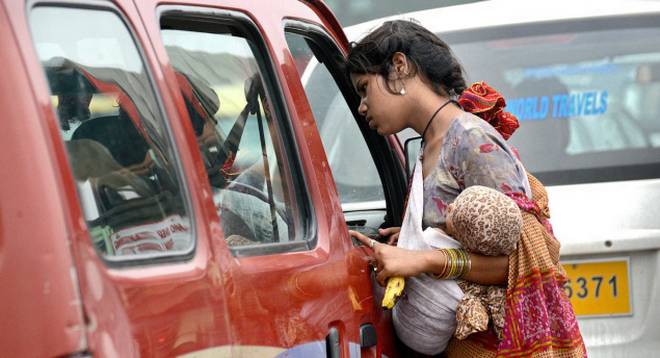Beggars are everywhere. You go to a religious place, you drive to work, you park your car outside a swanky mall, you’ll be sure to find beggars. These malnourished, handicapped people have the potential to melt even the coldest of hearts. It is natural for us to reach out to our wallets and gently drop a note or two in the calloused, trembling hands. But, have we ever taken a moment to understand who these people are , where they come from, are they a part of an organized syndicate or lone operators? Whole reaching out for a 10 Rs note, the question about the legality of begging in India doesn’t even come to our minds. We, well, simply give into our emotions.
Beggars in India
As per 2011 census data, there are over 4 lakh beggars in India. At 81,000, West Bengal has highest number of beggars, followed by Uttar Pradesh which where the tally stands at 65,000. The actual number of beggars in India is believed to be much (much) higher. For example, as per the census data, Delhi has only 2 thousand beggars while independent studies peg the number in the upwards of 50,000.
With more than 4 lakh official beggars, begging is also a multimillion-dollar industry and a well-organized one at that.
Begging as a well-organized profession
In Metro cities, begging operates like ‘organized crime’. Various ‘gangs’ which are involved in the profession abduct children and force them into the profession. Involving a Child in begging is highly profitable given the fact that, people are more likely to give money to poor and malnourished children. The ‘investment’ on these children is also less as they are poorly fed, kept is dismal conditions, and they lack the means to protest or rebel.
The child trafficking mafia sells the abducted children to begging mafia. These children are deliberately underfed by the begging mafia because the more malnourished a child beggar is, the more profitable they are.
In the case of a female child, the begging mafia sells them to prostitution mafia when they grow up after spending their childhood as a beggar.
Begging is so well organized that, in many cases, beggars rent out the place of profession just like corporates would take up a prime real estate office. The best example of this is the Haji Ali dargah in Mumbai where the beggars sit in line on road which leads to the dargah. The place of every beggar is unmistakably fixed and if some other beggar takes their land, s/he pays a fixed amount of money to original owner of the begging space.
Beggars as security threat
The ancient scriptures very clearly mention that beggars are a threat to the security of the country. From Chanakya Niti to Kanika Niti, most of the Indian texts on polity and statecraft highlight beggars as threat to internal and external security of the territory. Beggars have access to information about the locality and its choke points, and they could be easily lured by anti-social elements for information. Beggars have a sense of resentment towards the well-off and therefore they easily pass off information to anti-social elements. Imagine a clash between two communities, a beggar can easily double up as a spy.
All beggars are not poor
Generally, it is believed that only poor and disabled people and orphans are forced into begging. But there are many professional beggars whose monthly income runs into lakhs and they own apartments in posh localities. Bharat Jain, the richest beggar of the country, owns two apartments in Mumbai as well as rents a juice shop. His average monthly income is around 60,000 rupees.
How they spend money
According to a study by Hyderabad based sociologist Mohammed Rafiuddin, a beggar normally spends 20 percent of his earning on food, 30 percent on smoking and drinking, and “As much as 50 per cent goes towards savings.” One can easily spot beggars getting high on various addictions and even paying visits to red light areas. Therefore, if you donate to beggars for personal satisfaction, you are definitely not thinking right.
Child trafficking and Begging
According to the National Human Rights Commission, every year approximately 40,000 children are abducted and almost 10,000 of them remain unknown. Most of these children enter the begging industry. They are drugged, their body parts are traded, and the begging industry deliberately keeps them underfed. These children are used for drug trafficking and criminal activities.
Legality of begging
As per Bombay Prevention of Beggary Act, 1959 which has been extended to city of Delhi and many other cities, begging was made illegal in many states. Over the years, many states took the model of the Bombay Prevention Act and implemented it. According to Bombay Act, begging was a punishable offence with jail term which could extend up to 12 years. But, the implementation of law against begging remained moribund as with any other law in the country, and begging remains a flourishing industry.
The Delhi High Court, in an order dated August, 2018 struck down the law. The case for decriminalizing begging was led by left-liberal activists like Harsh Mander. The Court struck down the law criminalizing begging in the name of necessity and duress, as well as on the principles of equality and liberty embodied in the Constitution.
Conclusion
There is no doubt that every citizen of the country should be provided public goods. India, being a welfare state, ensures minimum living standard to every citizen. Majority of beggars seen in Metro cities are either professional beggars or are forced in the industry begging mafia. The money goes to illegal activities including crime and terror financing. Beggars are also security threat to the nation, almost every ancient Indian text of statecraft argues that begging should be illegal.The government needs to ensure minimum standard of living for every citizen, but, begging should be criminal offence. The common citizen should also not encourage begging by giving alms out of guilt trip.
